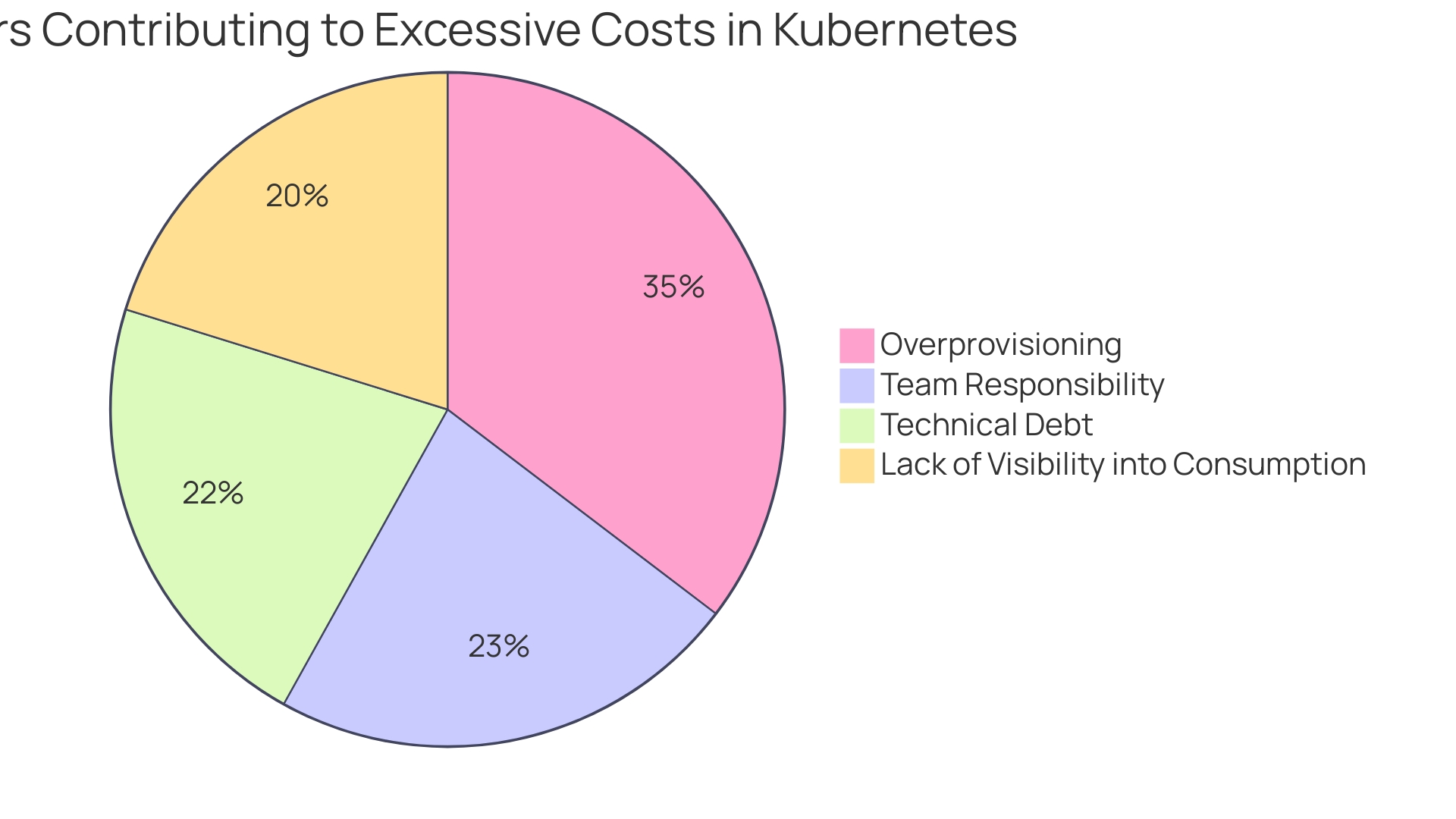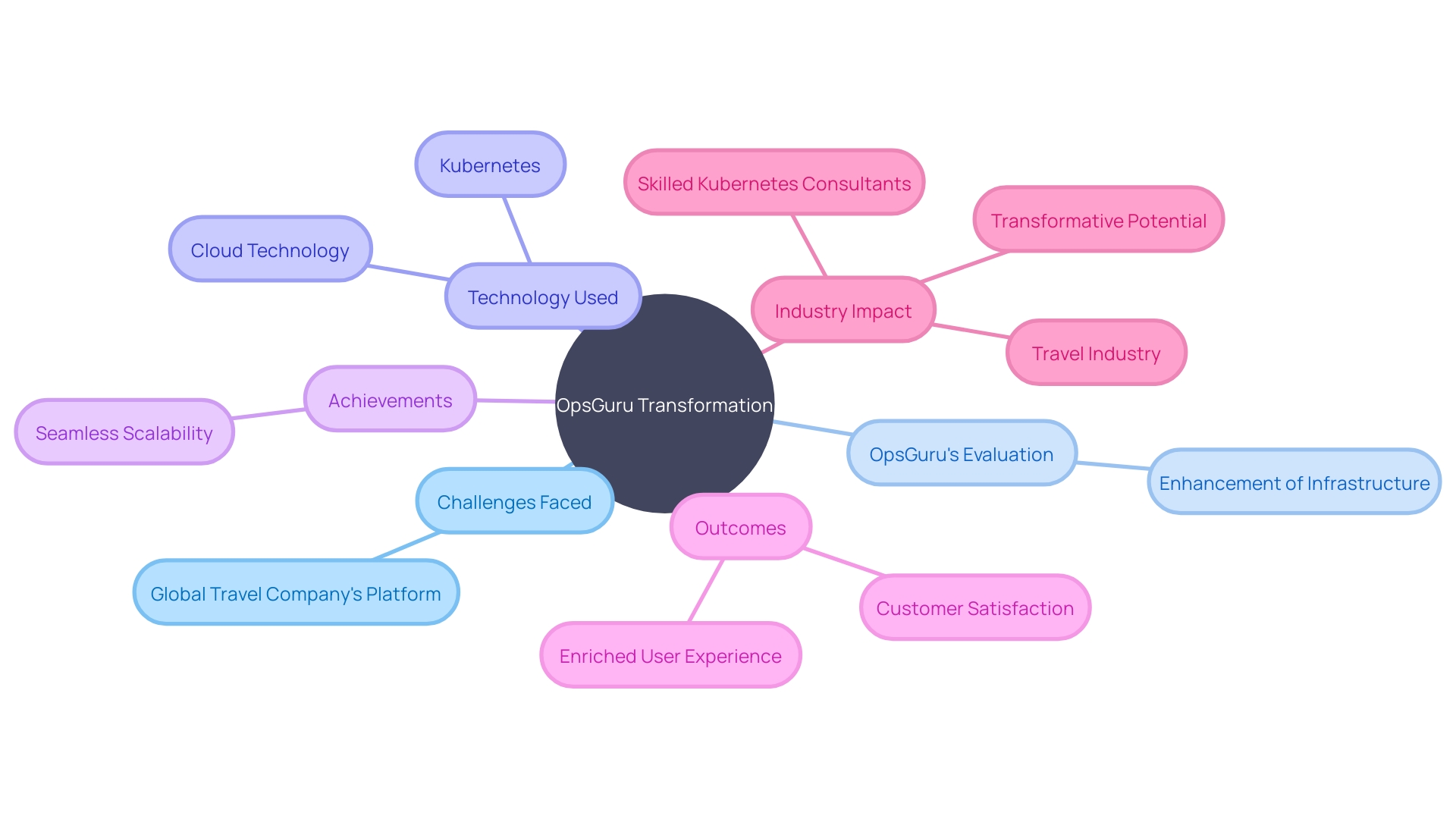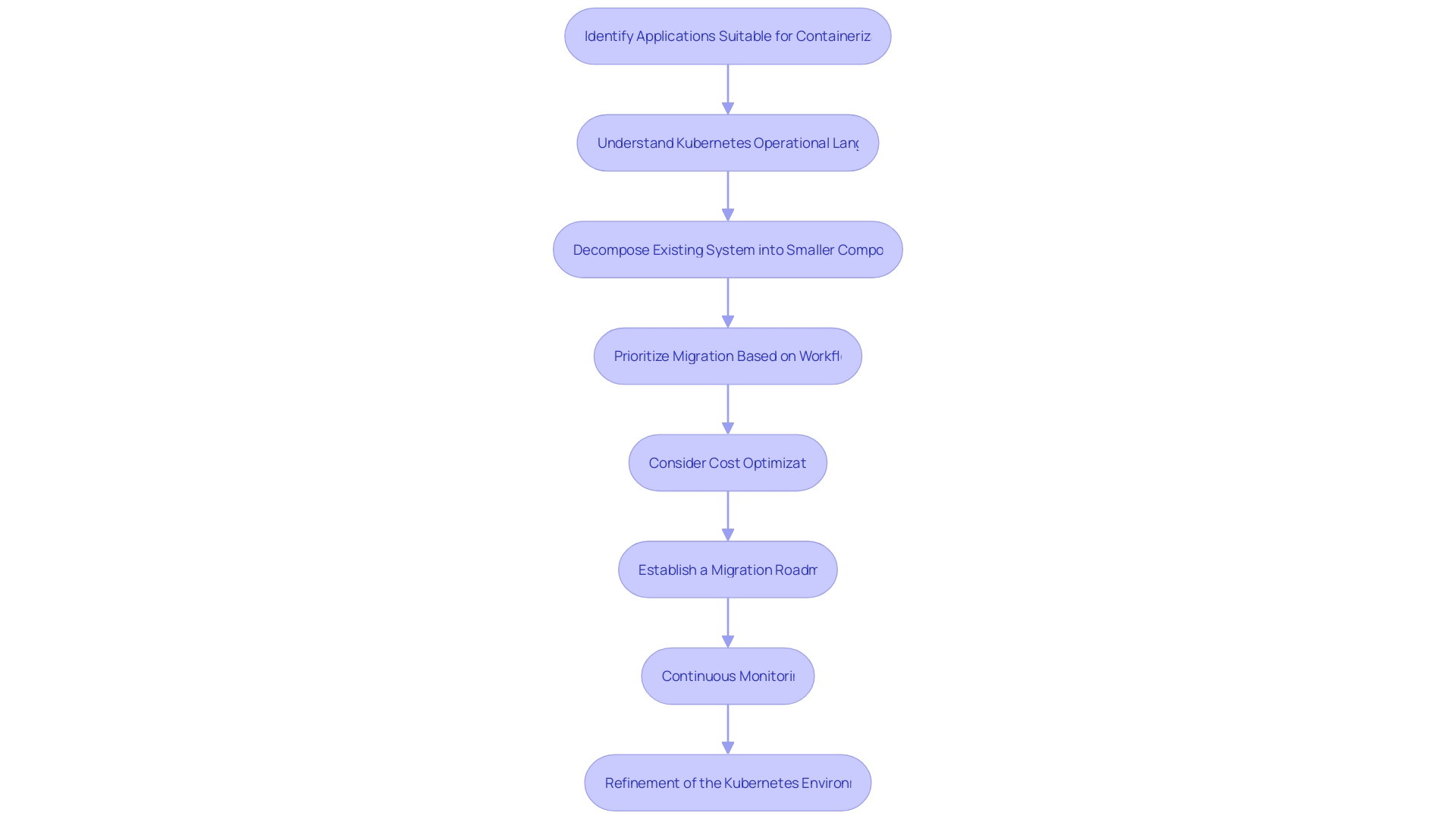Introduction
Kubernetes, with its robust experience in orchestrating production workloads, has revolutionized the management of containerized applications. In today's fast-paced digital ecosystem, Kubernetes simplifies deployment, ensures application resilience, and streamlines operations.
However, implementing Kubernetes comes with its challenges, including complexity and resource optimization. This is where Kubernetes consultants play a vital role, providing strategic insight and practical experience to manage Kubernetes clusters effectively.
They not only offer initial implementation but also ongoing support and training. In a case study, OpsGuru, a Kubernetes consulting powerhouse, successfully transformed a global travel company's platform, showcasing the power of Kubernetes consultants in revolutionizing industries.
Migrating to Kubernetes requires a meticulous approach, with considerations for system integrity and resource utilization. It involves decomposing existing systems, prioritizing components, and optimizing costs. A clear migration roadmap and continuous monitoring are crucial for success. Overall, Kubernetes consultants are instrumental in unlocking the full potential of Kubernetes and driving operational excellence.
Benefits of Kubernetes Adoption
Kubernetes, with its inception rooted in Google's robust 15-year experience of orchestrating production workloads, has revolutionized the management of containerized applications. By clustering containers into manageable, logical units, Kubernetes not only simplifies deployment but also ensures applications are resilient and continuously available—critical in today's fast-paced digital ecosystem.
Its automated system progressively rolls out application changes and configurations, diligently monitoring health to prevent simultaneous instance failures, and adeptly rolling back should issues arise. The platform's declarative approach, while initially daunting due to its distinct terminology and concepts, ultimately streamlines operations by clearly defining the desired state of applications.
This paradigm shift from traditional imperative methodologies pays dividends in productivity, as seen in the microservices architectures of innovative companies like FYNDNA. They've leveraged Kubernetes' foundational services to address cross-cutting concerns both at the network and application levels, ensuring minimal operational footprint.
Cost management, a vital aspect of cloud-native applications, is exemplified by Kubecost's leadership, managing over $3 billion in cloud expenditure. By aligning with the FinOps Foundation's standards and innovating with projects like OpenCost, Kubecost underscores Kubernetes' role in optimizing investments and fostering scalable, secure applications. Furthermore, Kubernetes' open-source nature invites a wealth of community-driven enhancements and a plethora of deployment solutions, ensuring that your application architecture remains future-proof and vendor-neutral. This, coupled with Role-Based Access Control, tightens security and allows seamless migration across cloud providers, making Kubernetes an indispensable tool for industries prioritizing compliance, such as financial services, and for digital agencies managing diverse client portfolios.
Challenges in Implementing Kubernetes
Kubernetes, while a robust platform for container orchestration, presents several challenges that require a strategic approach. The platform's complexity is evident as it demands a solid grasp of its intricate concepts and architecture.
To effectively manage Kubernetes clusters, a team with specialized skills is essential. As Mathias suggests, the best way to learn Kubernetes is through hands-on experience, building and troubleshooting to gain a deeper understanding.
Ivan also shares this sentiment, stating that breaking things and facing frustration head-on leads to a more profound comprehension and confidence in managing the technology. Integrating Kubernetes with existing systems can be tricky, but with its track record of over 15 years of running production workloads at Google and the collective wisdom of the community, Kubernetes has proven its reliability.
It offers progressive rollouts and an automated rollback feature for faulty deployments, ensuring stability and minimizing downtime. However, this integration requires meticulous planning and a clear strategy to ensure compatibility and a seamless transition.
When it comes to optimizing resource utilization, Kubernetes has its nuances. Auto-scaling, for instance, can lead to inefficiencies; while it scales up effectively, scaling down can result in resource wastage as nodes may remain active longer than necessary, leading to unnecessary expenses. Regular analysis and optimization of the Kubernetes platform are crucial for cost-effective operations. Despite the steep learning curve and the complexities of continuous deployment and monitoring, Kubernetes' growing ecosystem offers a wealth of deployment solutions. By investing in the necessary expertise and keeping abreast of the latest developments, organizations can leverage Kubernetes to orchestrate AI-model training workloads efficiently, even in environments with scarce AI compute resources.
How Kubernetes Consultants Can Help
Kubernetes consulting has emerged as a vital service for organizations aiming to harness the full potential of Kubernetes, the technology pioneered by Google with over 15 years of expertise in running production workloads. Consultants provide a blend of strategic insight and practical experience, ensuring that Kubernetes clusters are managed effectively based on industry standards and best practices.
They conduct comprehensive evaluations, identify areas for improvement, and align Kubernetes architecture with business objectives. For instance, our Martian Kubernetes Kit exemplifies a tailored solution that includes essential infrastructure elements pre-configured, saving clients from the complexities of setting up from scratch.
This approach underlines the importance of a meticulous setup and performance optimization for cloud-native applications. Consultants also emphasize the need for dedicated engineering resources due to the technical intricacies of Kubernetes, as echoed by one expert who highlighted the necessity for engineers to devote time to infrastructure and operations aspects of Kubernetes.
This is crucial for organizations, especially those new to container orchestration, to avoid common pitfalls such as overprovisioning, which was identified as the primary cause of overspending in Kubernetes by 70% of respondents in a survey. The survey also cited visibility into consumption, team responsibility, and technical debt as significant factors contributing to excessive costs. The role of Kubernetes consultants extends beyond initial implementation, offering ongoing support and training to ensure that internal teams are equipped to manage Kubernetes clusters. This not only involves dealing with real-time deployment and scaling but also setting up robust monitoring and logging solutions, as exemplified by CockroachDB's integration with Kubernetes, which streamlined their development and reduced manual labor. Ultimately, Kubernetes consultants are instrumental in unlocking the technology's power of automation and orchestration, allowing organizations to focus on their core operations while benefiting from Kubernetes' growing ecosystem and community support.

Case Study: Maximizing Success with Kubernetes Consultants
OpsGuru, a Kubernetes consulting powerhouse, stepped in to elevate a global travel company's platform amidst the dynamic demands of the travel industry. The travel company, already a dominant force in the B2B sector, was grappling with the challenge of scaling its operations to match its burgeoning user base.
OpsGuru's intervention began with a meticulous evaluation of the company's existing infrastructure, which led to the pinpointing of critical areas that required enhancement. Leveraging their profound expertise in cloud technology and Kubernetes, OpsGuru architected a robust solution that not only fortified the travel company's infrastructure but also equipped it to handle surges in traffic with unparalleled ease.
This strategic implementation facilitated seamless scalability, ensuring that the platform maintained its performance integrity, even during peak demand. The results were palpable: an enriched user experience and a surge in customer satisfaction, which resonated with the company's commitment to delivering excellence.
This transformation is a testament to the prowess of Kubernetes consultants in revolutionizing the travel industry, much akin to the way Travel Booking APIs have been instrumental in simplifying travel arrangements for consumers worldwide. Undoubtedly, the travel sector is witnessing an uptick, with providers seeking innovative ways to streamline operations and amplify the customer experience. APIs have emerged as a linchpin in this quest, offering a conduit for various travel services to be integrated into a single platform. This harmonization is shaping the future of travel, enabling providers to offer comprehensive, convenient, and efficient travel solutions that cater to the modern traveler's needs. OpsGuru's success story is a clear indication of the transformative potential that lies in the hands of skilled Kubernetes consultants, capable of steering travel platforms towards operational excellence and heightened customer delight.

Key Considerations for Migrating to Kubernetes
Transitioning to Kubernetes is a strategic move that involves a meticulous approach to maintain system integrity and optimize resource utilization. Migrating involves not only identifying which applications are ripe for containerization but also understanding the nuances of Kubernetes' operational language, which can be a steep learning curve for teams accustomed to traditional Linux operations. Dedicated personnel with a focus on Kubernetes can help bridge this knowledge gap, ensuring that the entire team can deploy and debug effectively, while a few can delve deeper into its complexities.
A common methodology is to decompose the existing system into smaller, manageable components, prioritizing them based on their role in the overall workflow and migrating each piece sequentially. This component-based strategy allows for a smoother transition and minimizes disruption. Alternatively, a flow-based migration tackles entire business streams in a single iteration, which may be suitable for distinct lines of business.
Cost optimization is paramount, especially since Kubernetes' autoscaling can inadvertently lead to overprovisioning. As the system scales down by decommissioning pods, nodes may persist longer than necessary, leading to unnecessary expenses. In fact, overprovisioning is cited as the primary reason for overspending by 70% of companies, highlighting the need for meticulous planning and monitoring.
Moreover, establishing a clear migration roadmap, complete with testing protocols and rollback strategies, is essential. This plan must take into account the idiosyncrasies of data management, security, and compliance, especially in cases where strict regulations govern the format of official documents, such as invoices. Finally, continuous monitoring and refinement of the Kubernetes environment will ensure optimal performance and cost management, as technical debt from inadequate re-architecting during cloud migration can contribute significantly to overspending.

Conclusion
In conclusion, Kubernetes consultants play a vital role in maximizing the potential of Kubernetes and driving operational excellence. They provide strategic insight and practical experience to effectively manage Kubernetes clusters based on industry standards and best practices.
Implementing Kubernetes comes with challenges such as complexity and resource optimization. Consultants assist organizations in navigating these challenges by offering hands-on experience and helping teams gain a deeper understanding of Kubernetes.
They also aid in integrating Kubernetes with existing systems, ensuring compatibility and a seamless transition. Kubernetes consultants offer ongoing support and training, equipping internal teams with the necessary skills to manage clusters effectively.
They enable organizations to focus on core operations while benefiting from the growing ecosystem and community support of Kubernetes. OpsGuru's case study exemplifies the transformative power of Kubernetes consultants.
By architecting a robust solution for a global travel company, OpsGuru facilitated seamless scalability and enhanced user experience, showcasing their impact on revolutionizing industries. Key considerations for migrating to Kubernetes include maintaining system integrity and optimizing resource utilization. Consultants assist organizations in decomposing existing systems into manageable components or adopting flow-based migration approaches. Cost optimization is paramount, as overprovisioning can lead to unnecessary expenses. A clear migration roadmap with testing protocols and rollback strategies is essential for success. In summary, Kubernetes consultants provide invaluable expertise in managing clusters effectively, driving operational excellence, and unlocking the full potential of Kubernetes in today's digital ecosystem.
Experience the transformative power of Kubernetes consultants for your business today!





